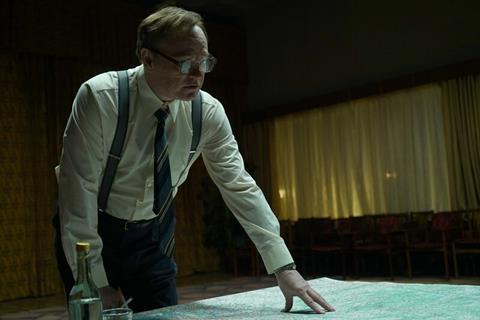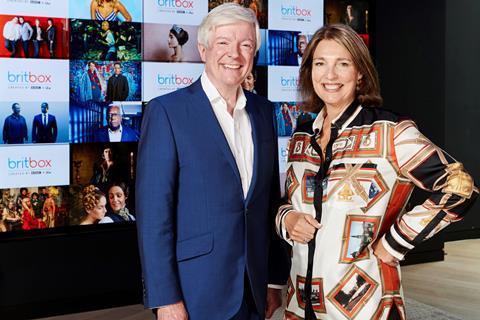Reflecting on the past twelve months, one clear TV industry trend stands out: the content business has been red hot.
2019 has seen a raft of mergers and acquisitions by major players in the content space. Headline deals have included Banijay acquiring Endemol Shine Group and Hasbro buying Entertainment One. All3Media is said to be close to buying producer/distributor Red Arrow, while Sony Pictures Television (SPT) this week acquired London and New York-based children’s animation firm Silvergate Media.

Disney also closed its $71bn acquisition of most of 21st Century Fox’s assets in March. Private equity firms have also got involved, with LDC (Lloyds Development Capital) taking a stake in Hostile Planet producer Plimsoll Productions over the summer. Also, Shine Group founder Liz Murdoch and former 20th Century Fox Film chair Stacey Snider both invested in Jane Featherstone’s Sister Pictures, producer of hit drama Chernobyl.
It’s not hard to see what is driving this wave of consolidation in the content sector. The streaming revolution has sparked an unprecedented spending spree by deep pocketed players like Netflix, Disney and Amazon who are prepared to endure significant losses for an extended period to grab market share.
They are investing specifically in premium content that can stand out in the market and win subscriptions. This plays to the strengths of production companies with scale, deep pockets and strong talent connections.
ITV chief operating officer David McGraynor says 2019 saw “the battle for eyeballs accelerate” with the launch of these new global and local SVOD players, and points out that industry consolidation has continued apace as business models adapt to the evolving market place.
“With content at the heart of all this change it’s never been a more exciting time to be a producer with a global footprint, strong creative talent, must have IP and global distribution.”
The average cost of producing a single episode of scripted drama is now close to $6m, twice the going rate of three to four years ago, according to Bloomberg Intelligence. Meanwhile, 16 firms, from Disney to Quibi, will spend a total of $100bn on content, according to UBS bank. That, noted The Economist in a recent report on the streaming business, is roughly equal to the sum invested in America’s oil industry this year.
The ultimate winners, argues Ralph Lee, director of content at BBC Studios Production, have been the viewers. “TV has never been better. In this kind of market, where content is fighting for space, it’s quality that will cut through. Programmes have to be distinctive if you want to attract attention and viewers.”
Lee says that outstanding programmes can still deliver mass audiences, pointing out that the first episode of Seven Worlds, One Planet launched with 8.7m, while Strictly Come Dancing gets 10m on a Saturday night and Killing Eve has had over 100m requests on iPlayer.

“It’s a great time for talent too,” adds Lee. “There are more opportunities than ever before for gifted writers, producers and performers. The scale of talent you can attract to television at the moment knows no limits. We’re also seeing British talent transmitting around the world which is really exciting.”
In the UK, the creative industries have provided an important ballast at a time when Brexit has prompted a slowdown in the wider economy. Official figures show the film and TV industry is the fastest growing part of the economy. Overall, the motion picture, television and music industry has grown by 43% since the start of 2016, compared with 6% in the service sector as a whole.
Facilities demand
2019 has also seen investment in the wider production sector to meet industry demand, most obviously in the studio space. Sky is building a new set of studios in Elstree. Disney has taken a long term lease for most of Pinewood, while Netflix has done the same at Shepperton. New studios are also being planned in cities such as Leeds, Scotland, Liverpool, and Birmingham.
Other countries are benefitting too. Netflix opened its first European production hub in Madrid earlier in the year, and has expanded its studio footprint in Toronto. Screen Queensland opened a new film studio in Brisbane.
The deal-making has also spilled into the post-production sector. UK post giant The Farm Group sold to Los Angeles-based post and VFX firm Picture Shop in June. It was Picture Shop’s second post acquisition in two months: in May it acquired Vancouver based Finale. Both deals were part of a strategy to tap into the transatlantic production boom.
Not all attempts do so have been successful. Visual effects studio DNEG shelved plans for its £600 million stock market flotation in November, citing “market uncertainties”.
Other post houses have sought to expand their international footprint to meet a growing global demand for high end visual effects. Scanline VFX announced plans to open a new studio in London, its seventh international facility. New York post house Harbor has expanded its facilities to London and Los Angeles. Outpost VFX opened its first international studio in Montreal, becoming the latest in a wave of British facilities to set up shop in the Canadian city.
Streamer war
The driver of all this change is, ultimately, the international streaming war, which intensified in November with the launch of Apple TV+ and then Disney+. The former was judged underwhelming, while the latter was a runaway success - Disney+ attracted more than 10m subscribers in its first day. More streaming services, such as HBO Max, Peacock and Quibi, are set to launch next year.

Richard Johnston, CEO of Endemol Shine UK, says the production group is “reaping the benefits” of the streaming boom not only with more customers but with co-productions and investment in UK creativity and talent. “There’s quite a bit of scaremongering about the impact of these new players but ultimately I think global and local will complement each other making our industry creatively and economically stronger.”
Traditional broadcasters have not taken the challenge lying down though. The BBC and ITV partnered for the October launch of the BritBox platform in the UK, while France Télévisions, TF1 and M6 won permission to launch their joint service Salto. Having launched in Germany, ProSiebenSat.1 and Discovery’s Joyn is planning to roll out internationally. The BBC has also said it planned to transform the iPlayer from a catch-up service into a destination in its own right, extending the window in which its content is available from 30 days to 12 months.
The streaming boom has, however, created major challenges for linear TV players, not least in terms of the loss of younger viewers. The disruption has affected budgets too, and changed the dynamics of production market for many producers who have seen the spending power of their key clients shrink.
Stuart Mullin, joint managing director at Greenbird, says a key trend has been the “stagnation” of linear TV budgets. This, he explains, has pushed producers to address a much wider range of customers, and to seek opportunities with streaming services.
Says Mullin: “Ultimately the effect will be to polarise production into those with a focus on domestic clients from whom they generate narrow margins, and those with a more global focus who can service international broadcasters. The fundamental pressure is therefore towards scale and global reach, and the days of the UK export market for rights may well consequently be drawing to a close for the truly independent producer.”

Meanwhile, Red Planet Pictures joint managing director Alex Jones says the business model of the indie sector is also changing as a result of the expansion of SVoD services. “New platforms obviously provide increased opportunities and an exciting new landscape, but potentially at the cost of more ’work-for-hire’ relationships; rather than producers retaining and exploiting their own IP as it has historically been done in the UK.
“Protecting the Terms of Trade is vitally important to the continued growth of the sector and for the protection of the independent production community.”
Dan Sefton, the co-founder of Seven Seas Films, who is also the writer and executive producer of BBC1 daytime crime drama The Mallorca Files, says one of the biggest business shifts he’s noticed this year is the creation of large European co-productions to tackle the streamers head on with bigger budget content.
He cites the launch of The Alliance, formed by France Televisions, Germany’s ZDF and Italy’s Rai, to create such shows. And he cites his own experience of working on The Mallorca Files, which secured funding from the BBC, BritBox in the US and Canada, German network ZDFneo and France 2. “Working with four major international investors on the series brought challenges, but ultimately it allowed us to make a show with higher than usual production value, whilst still retaining an affordable cost to each individual buyer.”
The changes have also affected the distribution market. DCD Rights CEO Nicky Davies Williams, says the pivotal role that distributors can play in bringing in pre-sales, combined with their finance to trigger new productions, has become “ever more relevant.” Distributors with large catalogues have also been boosted by the demand for new and classic titles from the digital platforms, she adds.
Argonon Group COO Laura Bessell speaks for many when she points out that the past 12 months has both been full of opportunity but also huge change in the market: “This disruption brings new premium content opportunities with the emergence of new streaming services, more opportunities with brands who want to think differently and opportunities to work with digital players.
”As an organisation we need to adapt to these new customers and opportunities and find ways to innovate production methods whilst keeping talent and storytelling at the forefront of everything we do.”
Anne Morrison, creative director for factual programmes at Nevision echoes this point. She notes, for example, that indie TV production revenues are now over £3bn a year. “There’s the opportunity for this growth to continue but a real danger that skills shortages will hold us back, particularly in less expensive productions. We need the industry to engage with this issue via bodies such as ScreenSkills to create a trained talent pipeline and ensure we don’t blow the opportunity.”
























No comments yet